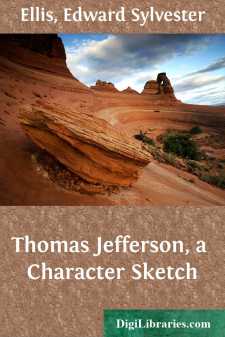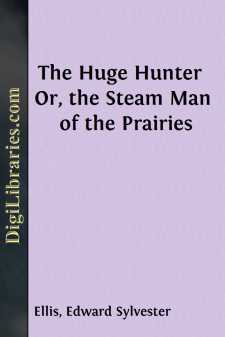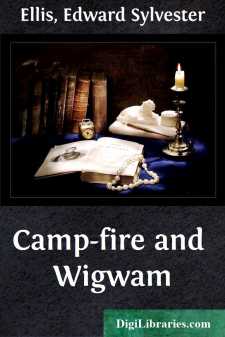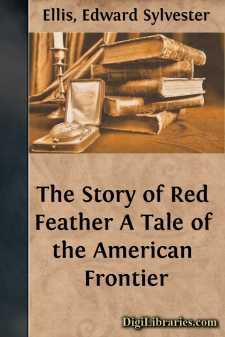Categories
- Antiques & Collectibles 13
- Architecture 36
- Art 48
- Bibles 22
- Biography & Autobiography 813
- Body, Mind & Spirit 142
- Business & Economics 28
- Children's Books 17
- Children's Fiction 14
- Computers 4
- Cooking 94
- Crafts & Hobbies 4
- Drama 346
- Education 46
- Family & Relationships 57
- Fiction 11829
- Games 19
- Gardening 17
- Health & Fitness 34
- History 1377
- House & Home 1
- Humor 147
- Juvenile Fiction 1873
- Juvenile Nonfiction 202
- Language Arts & Disciplines 88
- Law 16
- Literary Collections 686
- Literary Criticism 179
- Mathematics 13
- Medical 41
- Music 40
- Nature 179
- Non-Classifiable 1768
- Performing Arts 7
- Periodicals 1453
- Philosophy 64
- Photography 2
- Poetry 896
- Political Science 203
- Psychology 42
- Reference 154
- Religion 513
- Science 126
- Self-Help 84
- Social Science 81
- Sports & Recreation 34
- Study Aids 3
- Technology & Engineering 59
- Transportation 23
- Travel 463
- True Crime 29
Edward Sylvester Ellis
Edward Sylvester Ellis (1840-1916) was a prolific American author known for his contributions to juvenile fiction, particularly Westerns and adventure stories. Among his most famous works is "The Steam Man of the Prairies" (1868), which is considered one of the earliest science fiction novels featuring a robot-like invention. Throughout his career, Ellis wrote under various pseudonyms and produced over 400 novels, captivating young readers with tales of frontier life and adventure.
Author's Books:
Sort by:
CAPTAIN STRATHMORE’S PASSENGER A few hours before the sailing of the steamer Polynesia, from San Francisco to Japan, and while Captain Strathmore stood on deck watching the bustle and hurry, he was approached by a nervous, well-dressed gentleman, who was leading a little girl by the hand. “I wish you to take a passenger to Tokio for me, Captain Strathmore,” said the stranger. The honest, bluff...
more...
CHAPTER I ON A LOG I made the acquaintance of Ben Mayberry under peculiar circumstances. I had charge of the Western Union’s telegraph office in Damietta, where my duties were of the most exacting nature. I was kept hard at work through the winter months, and more of it crowded on me during the spring than I could manage with comfort. I strolled to the river bank one summer afternoon, and was...
more...
Chapter I. On a certain summer day, a few years ago, the little village of Briggsville, in Pennsylvania, was thrown into a state of excitement, the like of which was never known since the fearful night, a hundred years before, when a band of red men descended like a cyclone upon the little hamlet with its block-house, and left barely a dozen settlers alive to tell the story of the visitation to their...
more...
CHAPTER I. In the western part of Pennsylvania, near the commencement of the Ohio river, stands a small town, which, at the close of the last century, numbered about thirty dwellings. Although properly a border settlement at the time mentioned, there were so many others beyond, that it was hardly regarded as being in the "Mighty West." The inhabitants were mostly farmers, possessed of large and...
more...
No golden eagle, warm from the stamping press of the mint, is more sharply impressed with its image and superscription than was the formative period of our government by the genius and personality of Thomas Jefferson. Standing on the threshold of the nineteenth century, no one who attempted to peer down the shadowy vista, saw more clearly than he the possibilities, the perils, the pitfalls and the...
more...
CHAPTER I. THE TERROR OF THE PRAIRIES. 'HOWLY vargin! what is that?' exclaimed Mickey McSquizzle, with something like horrified amazement. 'By the Jumping Jehosiphat, naow if that don't, beat all natur'!' 'It's the divil, broke loose, wid full steam on!' There was good cause for these exclamations upon the part of the Yankee and Irishman, as they stood on...
more...
CHAPTER I. AT HOME. On the evening of a dismal, rainy day in spring, a mother and her son were sitting in their log-cabin home in the southern portion of the present State of Missouri. The settlement bore the name of Martinsville, in honor of the leader of the little party of pioneers who had left Kentucky some months before, and, crossing the Mississippi, located in that portion of the vast territory...
more...
CHAPTER I AN ENEMY IN A TREE One afternoon in early spring, Jack Carleton, a sturdy youth of seventeen years, was following a clearly-marked trail, leading through the western part of Kentucky toward the Mississippi river. For many a mile he followed the evenly spaced tracks made by a horse on a walk, the double impressions being a trifle more than three feet apart. "Helloa!" exclaimed, Jack,...
more...
CHAPTER ONE IT is within my memory that Melville Clarendon, a lad of sixteen years, was riding through Southern Minnesota, in company with his sister Dorothy, a sweet little miss not quite half his own age. They were mounted on Saladin, a high-spirited, fleet, and good-tempered pony of coal-black color. Melville, who claimed the steed as his own special property, had given him his Arabian name because...
more...
HO, FOR CALIFORNIA. One beautiful misummer night in 18— a large, heavily laden steamer was making her way swiftly up the Pacific coast, in the direction of San Francisco. She was opposite the California shore, only a day's sail distant from the City of the Golden Gate, and many of the passengers had already begun making preparations for landing, even though a whole night and the better part of a...
more...


![Adrift on the Pacific
A Boys [sic] Story of the Sea and its Perils](https://digilibraries-com.s3.eu-central-1.amazonaws.com/covers/5b1ab9f1-643e-492e-89a5-0a940f25d89d.jpg)








